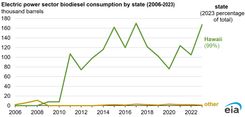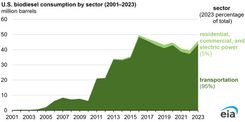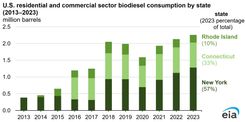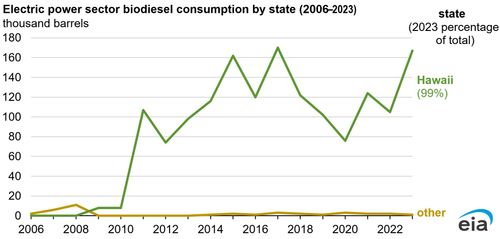EIA: US biodiesel use increases outside of the transportation sector




Data source: U.S. Energy Information Administration, State Energy Data System
April 4, 2025
BY U.S. Energy Information Administration
A small but increasing amount of biodiesel in the United States is consumed in the residential, commercial, and electric power sectors, according to new estimates now published in the U.S. Energy Information Administration’s State Energy Data System. Previously, the EIA allocated all U.S. biodiesel consumption to the transportation sector, where the vast majority of biodiesel is consumed.
Biodiesel is a renewable fuel produced using fats, oils, or greases usually blended with petroleum diesel and consumed by trucks. In 2023, the most recent year for which the EIA has estimates, the transportation sector accounted for about 95% of the nearly 46 million barrels of biodiesel consumed in the United States.
Biodiesel can also be blended with heating oil to heat homes and businesses. EIA estimates that the residential and commercial sectors combined accounted for nearly 5% of U.S. total biodiesel consumption in 2023, up from about 1% a decade earlier. The introduction of biofuel blending mandates for heating oil in some northeastern states is contributing to that growth. Although customers in other states likely blend biodiesel to heat homes and businesses, the EIA only estimates consumption for New York, Connecticut, and Rhode Island.
Advertisement
Consumption of biodiesel in the residential and commercial sectors is higher in New York than in any other state, accounting for 57% of the U.S. total for those sectors in 2023. New York City passed the nation’s first law requiring biodiesel blending with heating oil, mandating a minimum 2% biodiesel blended with heating oil beginning in 2012. Later, New York enacted a 5% minimum state-wide blend law beginning in 2022, which increases to 10% in 2025 and 20% in 2030. According to the U.S. Census Bureau’s American Community Survey, nearly 16% of homes in New York used heating oil as their primary heat source in 2023, about four times more than the U.S. average of about 4%.
Connecticut and Rhode Island also have similar state-wide minimum biofuel blend laws for heating oil. Connecticut’s 5% blend law began in 2022 and ramps up to 10% in 2025, 15% in 2030, 20% in 2034, and 50% in 2035. Rhode Island was the first state to enact a minimum biofuel heating oil blend law that began with a 5% blend in 2017 and increased to
Advertisement
10% in 2023. Rhode Island’s blend law increases more quickly than the other states—up to 20% in 2025 and 50% in 2030. More than 34% of homes in Connecticut and 26% of homes in Rhode Island reported heating oil as their primary heat source in 2023.
Biodiesel can also be burned to generate electricity, and the electric power sector accounted for less than 1% of U.S. biodiesel use in 2023. In 2006, a test plant in Tennessee reported the first biodiesel use for electric power in the United States. Hawaii has accounted for nearly all U.S. biodiesel consumed for electric power since 2009. In 2023, petroleum fueled about 68% of Hawaii’s total electricity generation, the highest share of any state, and the EIA estimates that biodiesel fueled about 1% of the state’s total generation.
Related Stories
The U.S. exported 31,160.5 metric tons of biodiesel and biodiesel blends of B30 and greater in May, according to data released by the USDA Foreign Agricultural Service on July 3. Biodiesel imports were 2,226.2 metric tons for the month.
CARB on June 27 announced amendments to the state’s LCFS regulations will take effect beginning on July 1. The amended regulations were approved by the agency in November 2024, but implementation was delayed due to regulatory clarity issues.
Global digital shipbuilder Incat Crowther announced on June 11 the company has been commissioned by Los Angeles operator Catalina Express to design a new low-emission, renewable diesel-powered passenger ferry.
ATR and French SAF aggregator ATOBA Energy on June 19 signed a memorandum of understanding (MOU) to explore ways to facilitate and accelerate sustainable aviation fuel (SAF) adoption for ATR operators.
Argent Fuels, a leading provider of carbon-saving fuels in the UK, is accelerating its efforts to support a greener future. The expansion of its High Blend Biodiesel will supply to bus, coach, HGV fleets and rail in the south of the UK.
Upcoming Events










